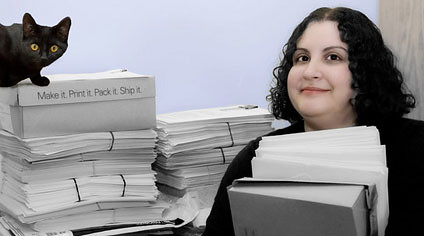
This week’s subject: Query Letters.
They’ve been on my mind a lot recently. With a draft of my post-Apocalyptic spec that I’m very pleased with to the point of being ready to show it to industry people, I’ve been thinking about what the next step is. In truth, there seem to be few answers; there aren’t a ton of contests right now, and even if there were, I don’t really feel like spending $50 on something that is as great a bet as query letters are; I don’t have many contacts that would allow me to bypass the query letter phase; and as unsure a bet as they are, query letters are quite common and – theoretically – painless.
I know that there are many different schools of thought on how much a writer should read about the business and craft. Personally, I haven’t read many screenwriting books. I read bits and pieces of a few while in school, but after a while they stopped being useful. It was the same experience for me this past week when I perused the internet for query letter advice.
Some sources had very strict rules. Others were general. Some advised to try and incorporate a bit of humor or interesting personal information. Others suggested getting right down to business. By the time I was done reading, I’d put together a sense of a general query letter – something I’d already known – with more “don’t dos” than “dos.” The inconsistent advice (one site’s “don’t” referenced another’s “do” example) just reinforced an opinion I have on reading screenwriting books – read everything, and you’ll be more confused than when you started.
I’ve known people who read every book that comes out on how to write a screenplay, and, with few exceptions, they’ve been the ones whose work has most often needed improvements. I’m not saying that reading how-to information, be it on writing scripts or query letters, is useless – it can be of great help. But an oversaturation of information, all of which comes from different people with different opinions, can lead to confusion or frustration.
After reading site after site on how to craft the best query letter – all of which said that chances of getting a response are hardly even 10 out of 100 – I decided to just go ahead. This week’s goal is to send out a query letter to at least a dozen companies. I wrote the letter last week. I’m happy with it. It’s no different than most of the “correct” examples I found. Since queries and e-queries are such a gamble anyway, what real reason do I have not to?
They’ve been on my mind a lot recently. With a draft of my post-Apocalyptic spec that I’m very pleased with to the point of being ready to show it to industry people, I’ve been thinking about what the next step is. In truth, there seem to be few answers; there aren’t a ton of contests right now, and even if there were, I don’t really feel like spending $50 on something that is as great a bet as query letters are; I don’t have many contacts that would allow me to bypass the query letter phase; and as unsure a bet as they are, query letters are quite common and – theoretically – painless.
I know that there are many different schools of thought on how much a writer should read about the business and craft. Personally, I haven’t read many screenwriting books. I read bits and pieces of a few while in school, but after a while they stopped being useful. It was the same experience for me this past week when I perused the internet for query letter advice.
Some sources had very strict rules. Others were general. Some advised to try and incorporate a bit of humor or interesting personal information. Others suggested getting right down to business. By the time I was done reading, I’d put together a sense of a general query letter – something I’d already known – with more “don’t dos” than “dos.” The inconsistent advice (one site’s “don’t” referenced another’s “do” example) just reinforced an opinion I have on reading screenwriting books – read everything, and you’ll be more confused than when you started.
I’ve known people who read every book that comes out on how to write a screenplay, and, with few exceptions, they’ve been the ones whose work has most often needed improvements. I’m not saying that reading how-to information, be it on writing scripts or query letters, is useless – it can be of great help. But an oversaturation of information, all of which comes from different people with different opinions, can lead to confusion or frustration.
After reading site after site on how to craft the best query letter – all of which said that chances of getting a response are hardly even 10 out of 100 – I decided to just go ahead. This week’s goal is to send out a query letter to at least a dozen companies. I wrote the letter last week. I’m happy with it. It’s no different than most of the “correct” examples I found. Since queries and e-queries are such a gamble anyway, what real reason do I have not to?






